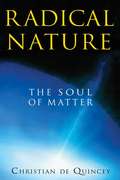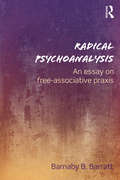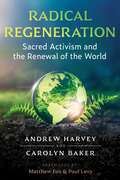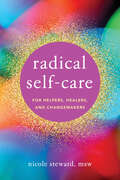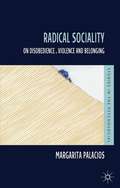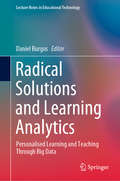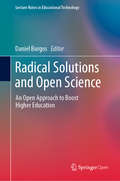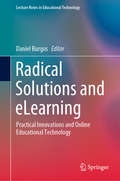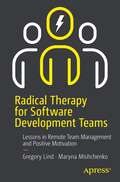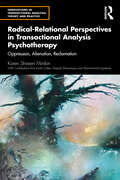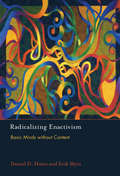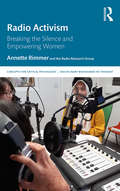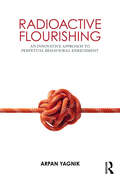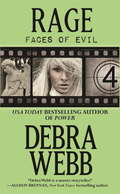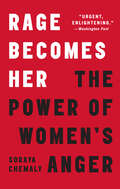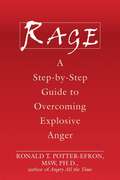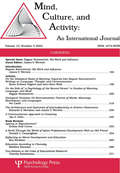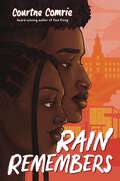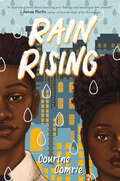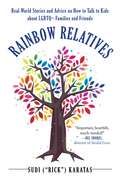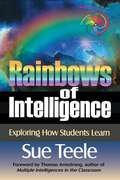- Table View
- List View
Radical Nature: The Soul of Matter
by Christian De QuinceyAn exploration of consciousness in all matter--from quantum to cosmos • Outlines theories of consciousness in ancient and modern philosophy from before Plato to Alfred North Whitehead • Reveals the importance of understanding mind-in-matter for our relationships with the environment, with other people, even with ourselves Are rocks conscious? Do animals or plants have souls? Can trees feel pleasure or pain? Where in the great unfolding of life did consciousness first appear? How we answer such questions can dramatically affect the way we live our lives, how we treat the world of nature, and even how we relate to our own bodies. In this new edition of the award-winning Radical Nature, Christian de Quincey explores the “hard problem” of philosophy--how mind and matter are related--and proposes a radical and surprising answer: that matter itself tingles with consciousness at the deepest level. It’s there in the cells of every living creature, even in molecules and atoms. Tracing the lineage of this idea through Western philosophy and science, he shows that it has a very noble history--from before Plato to Alfred North Whitehead. He reveals that the way to God is through nature and that understanding how body and soul fit together has surprising consequences for our relationships with our environment, with other people, and even with ourselves.
Radical Psychoanalysis: An essay on free-associative praxis
by Barnaby B. BarrattOnly by the method of free-association could Sigmund Freud have demonstrated how human consciousness is formed by the repression of thoughts and feelings that we consider dangerous. Yet today most therapists ignore this truth about our psychic life. This book offers a critique of the many brands of contemporary psychoanalysis and psychotherapy that have forgotten Freud's revolutionary discovery. Barnaby B. Barratt offers a fresh and compelling vision of the structure and function of the human psyche, building on the pioneering work of theorists such as André Green and Jean Laplanche, as well as contemporary deconstruction, feminism, and liberation philosophy. He explores how ‘drive’ or desire operates dynamically between our biological body and our mental representations of ourselves, of others, and of the world we inhabit. This dynamic vision not only demonstrates how the only authentic freedom from our internal imprisonments comes through free-associative praxis, it also shows the extent to which other models of psychoanalysis (such as ego-psychology, object-relations, self-psychology and interpersonal-relations) tend to stray disastrously from Freud's original and revolutionary insights. This is a vision that understands the central issues that imprison our psychic lives - the way in which the reflections of consciousness are based on the repression of our innermost desires, the way in which our erotic vitality is so often repudiated, and the way in which our socialization oppressively stifles our human spirit. Radical Psychoanalysis restores to the discipline of psychoanalysis the revolutionary impetus that has so often been lost. It will be essential reading for psychoanalysts, psychoanalytic psychotherapists, mental health practitioners and students and academics with an interest in the history of psychoanalysis.
Radical Regeneration: Sacred Activism and the Renewal of the World
by Andrew Harvey Carolyn Baker• Explores how Sacred Activism--specifically, creative, wise, sacredly inspired action--offers an antidote to the crises facing our world• Reveals how to uncover and sustain joy and how to use it as fuel for continuing Sacred Activism in dangerous times• Includes practical maps of the dark night process and of the four-part path to transfiguration drawn from the secret depths of the mystical traditionsPresenting a manual for navigating humanity&’s collective dark night, Andrew Harvey and Carolyn Baker explore potential antidotes, drawn from mystical traditions and Sacred Activism, to help us find inspiration and take action in the face of the daunting challenges to our world. Offering a deep discussion of our global dark night in terms of the Kali Yuga, the authors examine the dangers of a growing constellation of intractable crises--authoritarianism both in America and abroad, climate change, economic inequality, social upheaval, and spiritual malaise. They then explore the antidotes to these crises: Sacred Activism--specifically, creative, wise, sacredly inspired action--and a profound understanding of our evolutionary ordeal and its potentialities. Examining the power of joy to help enact personal and planetary transformation, they explain how joy, or ananda, is a force all mystical traditions recognize as the essence of the Divine. They reveal how to uncover and sustain joy in ourselves and how to use joy as fuel for continuing Sacred Activism in dangerous times. Drawing on the visionary teachings of mystics such as Pierre Teilhard de Chardin and Sri Aurobindo, the authors show how the global dark night is part of an evolutionary mutation process and how its very intensity makes it the potential seedbed of a new embodied, divine humanity. They offer practical maps of the crises, of the shadows that this global dark night is casting, and of the four-part path to transfiguration drawn from mystical traditions. Sharing a vision of a new and focused global moment of love in action, the authors reveal that apocalypse is not inevitable--if enough people awaken to the extraordinary possibilities of Sacred Activism.
Radical Self-Care for Helpers, Healers, and Changemakers
by Nicole StewardSolutions for tackling the deeply-rooted causes of burnout. Radical Self-Care for Helpers, Healers, and Changemakers addresses the constant exposure to heartbreak and injustice that can take a toll on the mental and physical health of those in the helping professions. After more than twenty years as a social worker, author Nicole Steward shares her own challenges with burnout and offers practical solutions to tackle the deeply-rooted causes of overwhelm that helpers face, which include compassion fatigue, vicarious trauma, and moral injury. Steward’s solutions go beyond mere stress-reduction techniques; rather, she offers a framework for engaging in radical self-care. Here readers will discover a way of being that prioritizes helpers and healers, so they can better serve others without sacrificing their own health and wellness. This book offers foundational strategies that challenge the current systems that contribute to the high rates of burnout and turnover in the human and social service professions. By taking radical care of themselves, helpers can take a more effective and resilient approach to their work, ultimately leading to liberation for both themselves and those they serve.
Radical Sociality
by Margarita PalaciosA philosophical and psychoanalytic investigation of relations to otherness, violence, disobedience and belonging, Radical Sociality explores the possibilities and vicissitudes of contemporary forms of belonging and the limits and challenges of democracy.
Radical Solutions and Learning Analytics: Personalised Learning and Teaching Through Big Data (Lecture Notes in Educational Technology)
by Daniel BurgosLearning Analytics become the key for Personalised Learning and Teaching thanks to the storage, categorisation and smart retrieval of Big Data. Thousands of user data can be tracked online via Learning Management Systems, instant messaging channels, social networks and other ways of communication. Always with the explicit authorisation from the end user, being a student, a teacher, a manager or a persona in a different role, an instructional designer can design a way to produce a practical dashboard that helps him improve that very user’s performance, interaction, motivation or just grading. This book provides a thorough approach on how education, as such, from teaching to learning through management, is improved by a smart analysis of available data, making visible and useful behaviours, predictions and patterns that are hinder to the regular eye without the process of massive data.
Radical Solutions and Open Science: An Open Approach to Boost Higher Education (Lecture Notes in Educational Technology)
by Daniel BurgosThis open access book presents how Open Science is a powerful tool to boost Higher Education. The book introduces the reader into Open Access, Open Technology, Open Data, Open Research results, Open Licensing, Open Accreditation, Open Certification, Open Policy and, of course, Open Educational Resources. It brings all these key topics from major players in the field; experts that present the current state of the art and the forthcoming steps towards a useful and effective implementation. This book presents radical, transgenic solutions for recurrent and long-standing problems in Higher Education. Every chapter presents a clear view and a related solution to make Higher Education progress and implement tools and strategies to improve the user’s performance and learning experience. This book is part of a trilogy with companion volumes on Radical Solutions & Learning Analytics and Radical Solutions & eLearning.
Radical Solutions and eLearning: Practical Innovations and Online Educational Technology (Lecture Notes in Educational Technology)
by Daniel BurgosEducational Technology is the right couple to a radical innovation. Thanks to the appropriate technology in the right context with the best fit to the target audience, education can be drastically improved, meaning a better performance, competence achievement, match with the user’s expectations and with the market needs. Serious games, Virtual reality, Augmented reality, Remote labs, Online learning, Blockchain, Mobile learning and many other key technologies allow for a better explanation of so many subjects, and even more: for a complete student involvement and a full teacher engagement into the educational system. Technology gives another angle to the same content, provides the user with a personalised experience and pushes the limits of knowledge a little further, every time. This book presents a number of radical innovations through technology, from experienced cases studies, to be replicated and inspired by; a powerful resource handbook for cutting-edge education.
Radical Therapy for Software Development Teams: Lessons in Remote Team Management and Positive Motivation
by Gregory Lind Maryna MishchenkoBuild and maintain effective, collaborative, and motivated software development teams. This book addresses the challenges in doing so, like communication gaps, trust issues, and motivation problems, and provides strategies to overcome them. You'll be introduced to the Radical Therapy Dev philosophy, a holistic approach designed to optimize software development teams for better performance and overall well-being. This book highlights common pain points in software development and offers solutions to resolving much of the issues in teams. It offers strategies for implementation, focusing on adaptability and accountability, while also promoting community-supported standards. And, the book reveals why an emphasis on fostering a growth mindset, mentorship programs, and junior-intern initiatives promotes continuous learning and collaboration.With the rise of remote work, you'll see why hiring globally while thinking locally is gaining popularity. You'll also gain insights into removing barriers to remote work, along with tools and policies for remote collaboration. Additionally, the book explores the concept of cloud-native software development and its benefits. Radical Therapy for Software Development Teams critiques the traditional "agile" methodology, identifying its shortcomings while extracting valuable lessons that can still be applied effectively. What You Will LearnAddress communication gaps, foster trust, and nurture a growth mindset among team membersAvoid common feedback mistakes, recognize accomplishments, and implement a reward systemImprove software development practices and team dynamics Take a scientific approach to project management rather than traditional requirements gatheringBreak Down Communication BarriersWho This Book is ForSoftware development professionals
Radical-Relational Perspectives in Transactional Analysis Psychotherapy: Oppression, Alienation, Reclamation (Innovations in Transactional Analysis: Theory and Practice)
by Karen Shireen MinikinRadical-Relational Perspectives in Transactional Analysis Psychotherapy assesses various forms of oppression in current, historical and personal perspectives and considers the impact this has on the development and sustenance of the psyche. Within this book, Minikin reformulates the ideas of Radical Psychiatry for the contemporary community, and both honours the historical legacy of including the social and political in transactional analysis and offers a critique of Eurocentrism in traditional relational perspectives. Through personal and clinical illustrations, Minikin encourages those in the TA community to move topics such as diversity from the margins to the centre when working with patients, and to integrate the political with traditional relational perspectives. The consequences of becoming marginalized through alienation speaks across multiple disciplines in social sciences, making this a must-read for counsellors, psychotherapists and other applied psychologists who want to think more deeply about social responsibility within their work.
Radicalizing Enactivism
by Daniel D. Hutto Erik MyinMost of what humans do and experience is best understood in terms of dynamicallyunfolding interactions with the environment. Many philosophers and cognitive scientists nowacknowledge the critical importance of situated, environment-involving embodied engagements as ameans of understanding basic minds -- including basic forms of human mentality. Yet many of thesesame theorists hold fast to the view that basic minds are necessarily or essentially contentful --that they represent conditions the world might be in. In this book, Daniel Hutto and Erik Myinpromote the cause of a radically enactive, embodied approach to cognition that holds that some kindsof minds -- basic minds -- are neither best explained by processes involving the manipulation ofcontents nor inherently contentful. Hutto and Myin oppose the widely endorsed thesis that cognitionalways and everywhere involves content. They defend the counter-thesis that there can beintentionality and phenomenal experience without content, and demonstrate the advantages of theirapproach for thinking about scaffolded minds and consciousness
Radicalizing Enactivism: Basic Minds without Content
by Daniel D. Hutto Erik MyinA book that promotes the thesis that basic forms of mentality—intentionally directed cognition and perceptual experience—are best understood as embodied yet contentless.Most of what humans do and experience is best understood in terms of dynamically unfolding interactions with the environment. Many philosophers and cognitive scientists now acknowledge the critical importance of situated, environment-involving embodied engagements as a means of understanding basic minds—including basic forms of human mentality. Yet many of these same theorists hold fast to the view that basic minds are necessarily or essentially contentful—that they represent conditions the world might be in. In this book, Daniel Hutto and Erik Myin promote the cause of a radically enactive, embodied approach to cognition that holds that some kinds of minds—basic minds—are neither best explained by processes involving the manipulation of contents nor inherently contentful. Hutto and Myin oppose the widely endorsed thesis that cognition always and everywhere involves content. They defend the counter-thesis that there can be intentionality and phenomenal experience without content, and demonstrate the advantages of their approach for thinking about scaffolded minds and consciousness.
Radikalisierung rechtsextremistischer Lone Actor Terroristen: Zum Einfluss sozialer Isolation und des Internets (Edition Rechtsextremismus)
by Stephanie Ohlrogge Torsten Jörg SelckÜber den Einfluss sozialer Isolation und des Internets auf die Radikalisierung von rechtsextremistischen Lone Actor Terroristen liegen bislang kaum theoretische und empirische Erkenntnisse vor, sodass die Untersuchung an dieser Forschungslücke anknüpft. Auf Basis einer vergleichenden Fallstudie werden praxisnah neue theoretische Erkenntnisse über die Wirkmechanismen der beiden Radikalisierungsfaktoren gewonnen. Insbesondere Online-Plattformen mit radikalen Communities spielen eine zentrale Rolle und können sowohl bei sozial isolierten als auch bei integrierten Einzeltätern gruppenbasierte Radikalisierungsprozesse initiieren.
Radio Activism: Breaking the Silence and Empowering Women (Concepts for Critical Psychology)
by Annette RimmerThis unique book draws on the narratives of women participants in community radio, using intersectionality, feminist, critical psychological and community development frameworks to explore how this highly symbolic, creative dimension of activism can unmute marginalised women and enrich corporate media. Over a period of four years, twelve female radio project volunteers offer their experiences which they analyse, together as part of the RRG (Radio Research Group), alongside a conceptual and contextual framework to produce insights on the gendered nature of silence, voice and empowerment, and the wider potential of radio activism. Employing literature from a variety of fields, from bell hooks to Stuart Hall, the book foregrounds evidence from the majority world to argue the empowerment potential of community radio and the barriers to radio participation. Through this analysis community radio emerges as a site of development, from which diverse identities transpire through laughter, dialogue, raised consciousness and solidarity, but it also exposes the conflicts of empowerment by recognising inherent tensions in womanhood and in communities. Centering on the global, hegemonic challenge of empowering women, and relevant across multiple disciplines and professions, this is fascinating reading for academics, students and professionals in psychology, gender studies, media studies, development and related areas.
Radio und Schizophrenie: Zur Radiotheorie der Schizoanalyse
by Ferdinand KlüsenerIn diesem Buch wird eine umfassende Radiotheorie der Schizoanalyse formuliert, die auf wenig erforschten Texten, Praktiken und Archivmaterial basiert. Im Mittelpunkt steht die Relevanz der Schizoanalyse für den ästhetischen Diskurs des 20. Jahrhunderts, insbesondere im Kontext der Radiokunst. Der Autor untersucht die Positionierung dieser Theorie zwischen Theater- und Medienwissenschaften und analysiert deren Beziehung zur Geschichte und Ästhetik des Radios. Durch die Verbindung des mikropolitischen Gestenbegriffs von Deleuze und Guattari mit Konzepten des Gestischen aus dem Lehrstück und deren Verortung in einer Phänomenologie der Zeit jenseits des Tragischen wird ein neuer theoretischer Rahmen geschaffen. Zudem werden bisher unbekannte auditive Objekte für die Historisierung und Kanonisierung der Radiotheorie entdeckt. Methodisch stützt sich die Arbeit auf Performanceanalyse, Medienarchäologie und Interviews mit Akteuren des Feldes. Das Buch leistet einen entscheidenden Beitrag zur Erforschung eines weitgehend unerforschten, aber zentral historisch relevanten Themas und definiert neue theoretische Konzepte für Theorie und Praxis.
Radioactive Flourishing: An Innovative Approach to Perpetual Behavioral Enrichment
by Arpan YagnikRadioactive Flourishing is for seekers of lasting happiness and peace. Radioactive Flourishing supplies cognitive insights for eventual behavioral stability. The USP of the book is its flipped human response toward instability. This book’s primary goal is to help people learn ways to flourish individually despite being surrounded by instability.This book is intentionally written in the "katha" style, which means that there are numerous relatable stories and a consistent journey from the core to the periphery, then to the tangent, and back. The implicit and explicit repetition of the key manifest enables the core intervening stimulation to encourage its readers to dig deeper and find solid footing in their flourishing being. This book is for seekers of happiness and peace.This book will be useful to students, researchers, young professionals, and faculty members working in the fields of business administration, psychology, start-ups, finance, entrepreneurship, and communication. It will also be an invaluable resource for aspiring leaders and students of life.
Rage (The Faces of Evil)
by Debra WebbThe fourth novel in Debra Webb's internationally bestselling FACES OF EVIL series, for fans of Karen Rose, Katia Lief and Mary Burton.Danger stalks Jess Harris. Still new to her Deputy Chief position at Birmingham, Alabama's Major Crimes division, she's rebuilding her life after losing everything. But messages from a notorious serial killer continue to haunt her...When the wife of a Birmingham detective is found dismembered in her home with writing streaked across the walls in blood, Jess knows they are up against something truly evil. Is this gang related, a personal vendetta or even more sinister? As two more victims are discovered and evidence points to a shocking suspect, Jess realises the mother's autistic son could hold the key to the killer's identity. But who will protect them now they are next on the hit-list? And will Jess act in time to prevent one final, horrifying act of rage?Catch the rest of the heart-stopping series: Obsession, Impulse, Power, Rage, Revenge and Ruthless.
Rage Becomes Her: The Power of Women's Anger
by Soraya Chemaly***A BEST BOOK OF 2018 SELECTION*** NPR * The Washington Post * Book Riot * Autostraddle * Psychology Today ***A BEST FEMINIST BOOK SELECTION*** Refinery 29, Book Riot, Autostraddle, BITCH Rage Becomes Her is an &“utterly eye opening&” (Bustle) book that gives voice to the causes, expressions, and possibilities of female rage.As women, we&’ve been urged for so long to bottle up our anger, letting it corrode our bodies and minds in ways we don&’t even realize. Yet there are so, so many legitimate reasons for us to feel angry, ranging from blatant, horrifying acts of misogyny to the subtle drip, drip drip of daily sexism that reinforces the absurdly damaging gender norms of our society. In Rage Becomes Her, Soraya Chemaly argues that our anger is not only justified, it is also an active part of the solution. We are so often encouraged to resist our rage or punished for justifiably expressing it, yet how many remarkable achievements would never have gotten off the ground without the kernel of anger that fueled them? Approached with conscious intention, anger is a vital instrument, a radar for injustice and a catalyst for change. On the flip side, the societal and cultural belittlement of our anger is a cunning way of limiting and controlling our power—one we can no longer abide. &“A work of great spirit and verve&” (Time), Rage Becomes Her is a validating, energizing read that will change the way you interact with the world around you.
Rage: A Step-by-Step Guide to Overcoming Explosive Anger (Personal Development)
by Ronald T. Potter-EfronRage can be calmed and controlled with good advice and a practical, effective plan for change. From renowned anger expert Ronald Potter-Efron, this book breaks down rage into four types: In survival rage, anger is triggered by a sense of danger or threat; feelings of helplessness can trigger impotence rage; the third type, abandonment rage, is triggered by a fear of losing a cherished relationship; and shame rage occurs when someone feels very disrespected. Rage briefly discusses how the brain functions during extreme emotion, and then it turns to the task of helping you stop episodes of rage-right now! In classic Potter-Efron style, the book places the responsibility for control squarely on the shoulders of the angry individual. There is no room in this dangerous situation for whys and becauses. Instead, Rage offers no-nonsense, step-by-step anger management tools that really work.
Ragnar Rommetveit: His Work and Influence:a Special Issue of mind, Culture, and Activity
by James V. WertschThis special issue of Mind, Culture, and Activity revisits Rommetveit's ideas in admiration for his quest to understand meaning, language, and mind. It also reflects the inspiration he has provided for those struggling with these issues. Written by those studying Rommetveit and one by Rommetveit himself, all three articles are attempts to spell out, extend, and apply ideas that Rommetveit outlined in his writings at some point early in his career. Rommetveit, however has moved ahead in his struggle to understand the ethical dimensions of communication--including the communication involved in the study of communication--which represents his newest project.
Rain Remembers
by Courtne Comrie"A satisfying, well-written, and authentic sequel highlighting the ways healing and self-love are ongoing processes."—Kirkus Reviews (starred review) In the companion novel to the critically acclaimed Rain Rising, Rain must once again find the strength to rise above.The start of the school year is bringing a lot of changes for Rain: New school. No Circle Group. No Dr. McCalla. No Miss Walia. No step team. And Xander, her older brother and superhero, is away at college.Although everyone else seems okay with change, Rain struggles to open up to her new counselor, her mom, Umi, Alyssa, and even Xander, who seems to have forgotten all about her while away at college. But when an older boy starts giving Rain more attention than she asked for—will she be able to open up again before things go too far?As Kirkus Reviews said of Rain Rising: "A gorgeous debut: a necessary, cathartic, immersive healing experience.” Readers will be eager to follow Rain in this companion novel. Like the rain, she is both gentle and a force, finding strength to rise again.
Rain Rising
by Courtne ComrieAn inspiring debut middle grade novel-in-verse about Rain, who must overcome sadness after her all-star brother is badly beaten up at a frat party. Genesis Begins Again meets Brown Girl Dreaming in this powerful story of perseverance, family, and hope.“A captivating novel about honoring your feelings and learning to love yourself.” —Janae Marks, author of From the Desk of Zoe Washington“A powerful novel about mental health, self-love, and family. Filled with tenderness and heart.” —Mariama J. Lockington, author of For Black Girls Like Me and In the Key of Us Rain is keeping a big secret from everyone around her: She's sad. All the time. Rain struggles with her image and feels inferior to her best friend, Nara. Not even her all-star student-athlete big brother (and personal superhero), Xander, can help Rain with her dark thoughts and low self-esteem.And when Xander becomes the victim of violence at a predominantly white university, Rain’s life and mind take a turn for the worse. But when her favorite teacher, Miss Walia, invites her to an after-school circle group, Rain finds the courage to help herself and her family heal.Like the rain, she is both gentle and a force, finding strength to rise again.“You can't help but fall in love with this book. Heartbreaking, emotional, and a ride well worth taking.” —Marie Arnold, author of The Year I Flew Away and I Rise“Everyone who reads this will be inspired by Rain's dedication to finding healing.” —Elisabet Velasquez, author of When We Make It
Rainbow Relatives: Real-World Stories and Advice on How to Talk to Kids About LGBTQ+ Families and Friends
by Sudi Rick" KaratasWhether you have your own questions because you’re preparing to come out to your kids, or you aren’t sure how to explain to your kids why their uncle has a boyfriend or why their friend has two mommies, this book can help. With an entertaining and educational approach to educating yourself and your peers about the issues and topics surrounding the LGBTQ+ community, Rainbow Relatives will provide answers to your kids’ questions and help you raise them to be open-minded and accepting adults.First and foremost, this book will help you approach the conversations you need to have and predict what you can expect from them. Author Sudi Karatas tells a variety of stories, such as that of a Mormon woman’s transition from fighting against gay rights to becoming a crusader for them. Also included are the voices of filmmakers, actors, musicians, mental health professionals, and more. Through Rainbow Relatives, Karatas helps parents support, advocate for, and educate their children, relatives, and family friends.
Rainbow in the Dark
by Sean McGintyThe Wizard of Oz meets Ready Player One in this darkly comic YA novel about identity, depression, giving up, and finding your way home.High school senior Rainbow is trapped with three other teens in a game-like world that may or may not be real. Together, they must complete quests and gain experience in order to access their own forgotten memories, decode what has happened to them, and find a portal home. As Rainbow&’s memories slowly return, the story of a lonely teen facing senior year as the new kid in a small town emerges. Surreal, absurdist humor balances sensitively handled themes of suicide, depression, and the search for identity in an unpredictable and ultimately hopeful page-turner that's perfect for fans of Shaun David Hutchinson, Adam Silvera, and Libba Bray's Going Bovine.
Rainbows of Intelligence: Exploring How Students Learn
by Sue TeeleThis book explores the multiple ways students process information and examines multiple intelligences through the relationship between rainbows, colors, and how individuals learn. If we consider the full range of human potential as the spectrum of the rainbow, then each individual is unique and has the potential to develop all of the intelligences using different areas of the brain. The author has included several lesson plans that can be adapted for students of any age, and has written them to meet U. S. and California standards. This book will be a valuable resource for educators and administrators, school boards, and parents.
